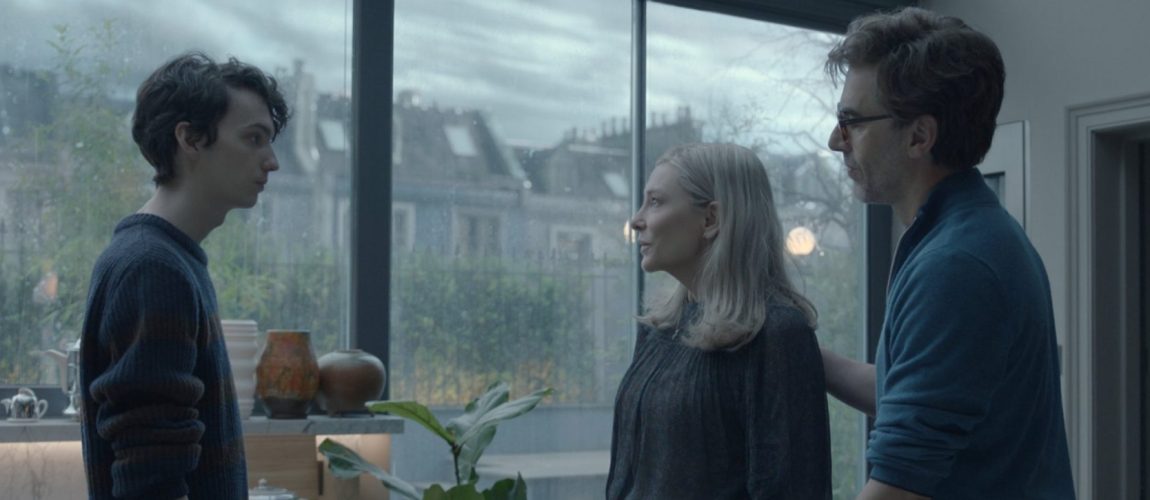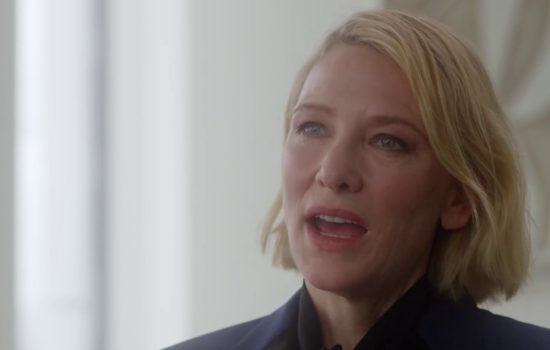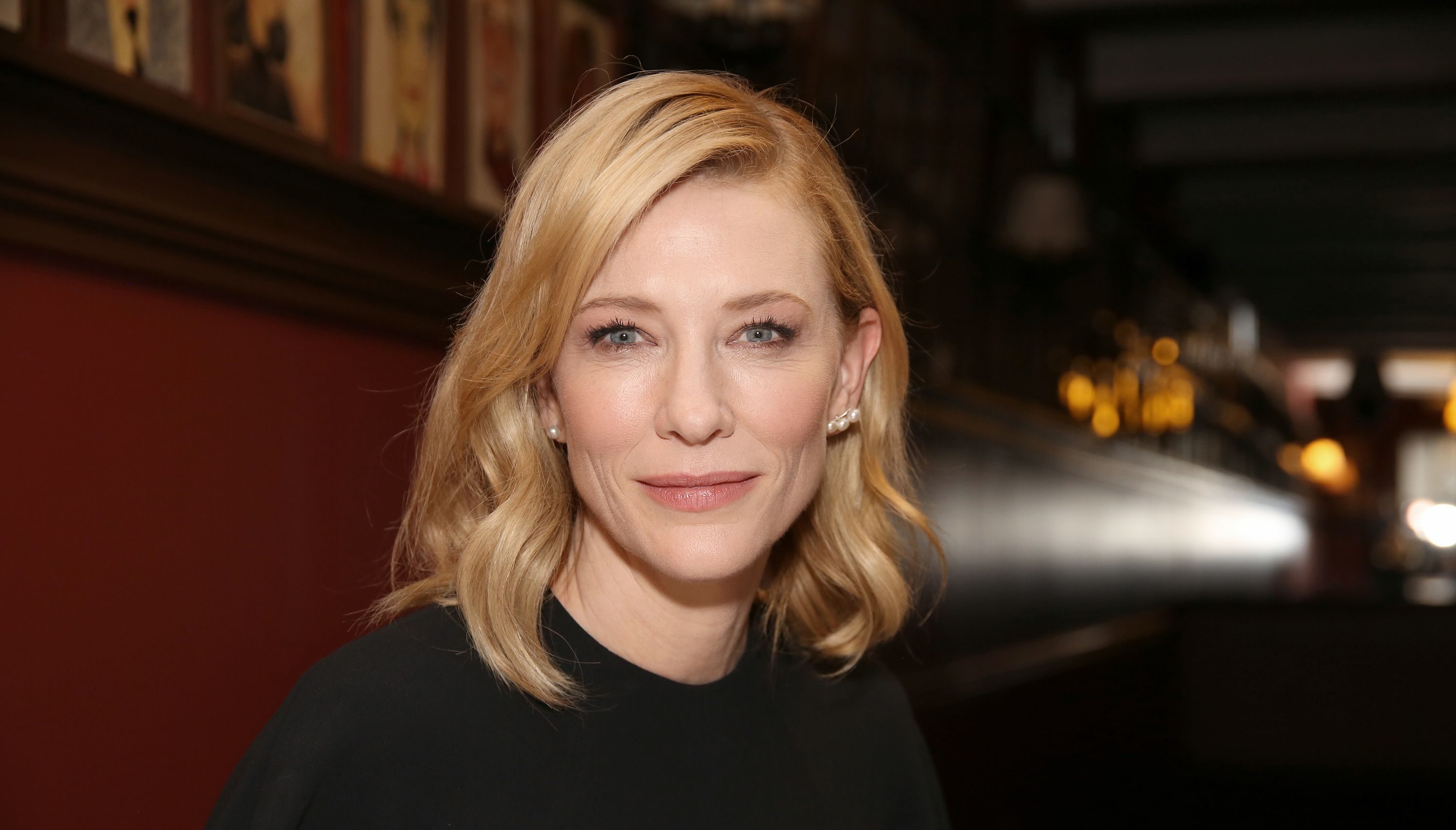DISCLAIMER* which is written and directed for the screen by Alfonso Cuarón will debut Chapter I & II on Apple TV+ on 11 October. The psychological thriller miniseries is based on the novel of the same name by Renée Knight. The series is led by Cate Blanchett and Kevin Kline. The remaining chapters will subsequently be released on Apple TV+ every Friday.
Tomorrow, Chapters I – III will have its UK premiere at London Film Festival. Chapters IV – VII on 11 October will screen for free. More here.
Below are some interviews with Cate Blanchett ahead of the series’ release. Check out the teaser, trailer, and clips too.
SYNOPSIS: Acclaimed journalist Catherine Ravenscroft (Blanchett) built her reputation revealing the misdeeds and transgressions of others. When she receives a novel from an unknown author, she is horrified to realize she is now the main character in a story that exposes her darkest secrets.
As Catherine races to uncover the writer’s true identity, she is forced to confront her past before it destroys her life and her relationships with her husband Robert (Sacha Baron Cohen) and their son Nicholas (Kodi Smit-McPhee). The ensemble cast includes Lesley Manville, Louis Partridge, Leila George and Hoyeon, and features Indira Varma as the narrator.
Chapter I & II — 11 October
Chapter III & IV — 18 October
Chapter V — 25 October
Chapter VI — 1 November
Chapter VII — 8 November
Interviews
Premiering on Apple TV+ this Friday, Disclaimer follows the cat-and-mouse drama between award-winning documentary filmmaker Catherine Ravenscroft (Cate Blanchett) and retired private-school teacher Stephen Brigstocke (Kevin Kline). At the outset of the story, the two are separated by generations, geography and class, the central mystery of Disclaimer being how the two could be possibly connected – let alone so intertwined as to fuel what appears to be Stephen’s vendetta to shame Catherine from public life.
To get to the terribly upsetting answer, Cuarón – adapting the page-turning novel by Renee Knight – engages his audience in a number of visual and narrative games, the nature of which veers between luxuriously high-minded and of the cheaply parlour variety.
Reputations are ruined, relationships are tested, and the past comes back to haunt the living with such ferocity that some characters might simply wish themselves dead. But the greatest contest of wills comes from Blanchett’s side of things, given that her character must remain what might charitably be called an enigma until Disclaimer’s very final chapter, which upends the entirety of the story with such blunt force that audiences might be compelled to rewatch the entire thing over again, to spot the clues and cues.
Which is exactly the effect that Blanchett was hoping to achieve when she signed onto the ambitious project, shot largely in chronological order, across continents and with some of the film world’s top names (including cinematographers Emmanuel “Chivo” Lubezki and Bruno Delbonnel) working to elevate the small-screen form into something bigger.
“There was an incredible amount of tension in that my character doesn’t get to express her perspective for quite a number of those chapters, so it was challenging to be ambiguous for that long and live with that amount of tension,” Blanchett says in an interview during the Toronto International Film Festival last month.
Just as Cuarón has never called Disclaimer a “series” in interviews, so, too, does Blanchett refer to the project exclusively in the more cinema-friendly language of “chapters” rather than “episodes.”
“It was almost like making seven movies back to back,” Blanchett says. “And with the greatest cinematographers alive lighting it, too. Which meant there was a lot of wait time. But you learn to manage that – that’s the job.”
The job in Disclaimer’s case adds up to one of Blanchett’s most challenging roles in a career overflowing with them. As Catherine, who is targeted by Stephen with such brute and righteous force that the audience is compelled almost immediately to vilify her, Blanchett must portray a woman constantly on the defence. As the series jumps back and forward in time, though, the real stakes of Disclaimer reveal themselves.
The job in Disclaimer’s case adds up to one of Blanchett’s most challenging roles in a career overflowing with them. As Catherine, who is targeted by Stephen with such brute and righteous force that the audience is compelled almost immediately to vilify her, Blanchett must portray a woman constantly on the defence. As the series jumps back and forward in time, though, the real stakes of Disclaimer reveal themselves.
“With serialized storytelling, in a way you became a slave to the narrative. So even though the faces and voices we’re seeing on screen are less homogeneous than they used to be, the way these things are released and commissioned is becoming increasingly homogeneous,” she says. “Things that are wildly different can start to taste the same. And what I loved about Alfonso is he said, ‘I don’t know how to make that stuff.’ So he w
“It sounds a little pretentious to call them ‘chapters,’ but it’s true,” Blanchett says, referring to Disclaimer. “Somehow the intention that it be seen in a cinema keeps the ideas big, and I think allows you to reach dare I say a poetic reality that doesn’t always have to make narrative sense. That’s what I love about this – there’s a rhythmic sense to this series, or film, which defies I suppose more conventionally made things.”
One of the most technically challenging projects of Cuarón’s innovative career – think of the director’s swirling “single-take” shot during the car hijacking in Children of Men, or the free-floating chaos of Gravity – Disclaimer took the better part of a year to shoot, with Blanchett and the rest of the cast (including Sacha Baron Cohen in a rare dramatic role, playing Catherine’s husband) having to live with their characters, and their shifting perspectives, for longer than a feature film, or even a single-season series, might require.
“We’re still shooting Disclaimer, I think,” Blanchett says with a laugh, noting how she took a year off after the project, and then refreshed herself with the political farce Rumours from Canadian directors Guy Maddin, Evan Johnson and Galen Johnson, a movie that could not be more dissimilar in tone and execution.
“In a strange way, each job is by default not by design an antidote to the one before it,” Blanchett says, emphasizing that accidental scheduling and good timing rules the day, not necessarily thematic or storytelling sensibility.
However Blanchett’s schedule might have made room for Disclaimer, though, its final episode – or chapter, apologies – makes the entire endeavour worthwhile, even monumental.“That last episode was very important, and Cate was adamant about it working – not just as an actor in the film, but as a full-time collaborator,” Cuarón says in a separate interview. “Her credit as an executive producer is not just cosmetic. She was very concerned about how we would not cheat at any moment. It is her work.”
Full interview on Globe and Mail
“Disclaimer” trains its lens on Catherine Ravenscroft (Blanchett), an acclaimed journalist and documentarian. In the first episode, she is honored by Christiane Amanpour, playing herself, who celebrates Catherine for cutting through “narratives and forms that distract us from hidden truths” and revealing “our own complicity in some of today’s more toxic social sins.”
Amanpour’s introduction neatly outlines the show’s thematic concerns: narrative, truth, complicity. As Kline put it, wary of spoilers, “So much of the story is about prejudices and false narratives and fake news and real news.”
That story is sufficiently gripping, with at least one major twist, and the characters — Catherine; Robert (Baron Cohen), her husband; Stephen (Kline), a former schoolteacher who arranges for the novel’s publication — are all appropriately layered. But Cuarón was wary of reducing the show to an unfolding of plot and character, which was what a normal-length film would have required.
Instead, he wanted to confront the formal challenge of the book’s competing narratives. He also wanted to experiment with narration as something other than a storytelling crutch. The series ultimately includes three different voice-overs: one presented in first-person point of view, one in second and one in third.
“The point is to challenge the narrative,” Cuarón said. “To challenge the viewer with their own narrative.”
Casting was a relatively simple affair. Most of the actors had been eager to work with Cuarón.
“Who wouldn’t be?” Blanchett said during a recent video call. “And to be invited into a formal departure for him, moving as a filmmaker into serialized storytelling, was really super exciting.”
Even as Cuarón recognized that “Disclaimer” was now a series, he was determined to make it in the same way that he would make a film. He enjoys television, he said, and believes that it offers the best writing in mainstream entertainment. But he wanted more than that.
“The writing can be excellent; it can be astounding,” he said. “But rarely are you confronted with a cinematic experience.” In his hands, “Disclaimer” would not be a show that could be watched while also scrolling through your phone. The framing, the lighting, the gestures — all would offer clues to the story and would demand attention.
Cuarón now acknowledges that shooting a series like a film was in some ways a miscalculation. He did not consider how long that might actually take. By the end, Cuarón said, “we were all exhausted.”
“Disclaimer” began filming in London in the spring of 2022. A typical television show might grind through seven or eight pages of script each day; Cuarón would shoot just one. “Because it’s so much about the choices and the decisions in the blocking, in the specificity of the movement,” he said.
Covid infections caused other delays. Shooting ultimately ran about a year, with the actors having to spend all of that time in some unusually dark psychological spaces.
“I didn’t sleep very much, and it wasn’t pleasant,” Blanchett said. “But it was very creatively fulfilling.”
Viewers will be tempted to judge the characters and their actions, Catherine’s particularly. The early episodes, especially, invite and even encourage viewers to indulge their own biases. But at seven hours, the series sits with the characters long enough that many viewers may be forced to contradict and second-guess those initial judgments. They too may eventually find themselves complicit, even when there are plenty of clues along the way, visual and otherwise, that complicate the story.
Even Blanchett was susceptible. After reading the first scripts, she was hesitant to play the character. Cuarón told her to read to the end.
Though the series is not expressly didactic, it ultimately argues against rushing to judgment. But Cuarón resists the notion of the show as crusade.
“You don’t want filmmakers to fix the world,” he said. “I don’t think cinema changes anything. Cinema can inspire, that’s it.”
Of course, this is television, not cinema. But Cuarón and the cast hope that its themes and its cinematic qualities will make “Disclaimer” worth watching with the same attention one might give to a theatrical release. Maybe they will even rewatch it — Blanchett thinks “Disclaimer” will reward repeat viewings.
“The interesting thing about the series is we think we know our friends, we think we know our partners, our children, our relatives,” Blanchett said. “But how well do we know them?”
Full interview on NY Times
“Disclaimer” throws you into the fire; And like everyone else in the show, from strangers reading the book to Catherine’s husband, you start making assumptions about and judging her. Not even Blanchett was immune reading the script. She wondered: Is this woman awful?
“I was shocked at the layers of judgment that I transposed on the character,” Blanchett said. “The challenge and agony of playing a character like this is that the crisis happens as soon as you meet her. We know nothing about her, only what people are saying about her.”
Sometimes, Cuarón said, he’d be on board with her suggestions. Other times he chose a different path and usually regretted it. But they consulted on everything from the smallest details (like prop placement) to the biggest, including the script and casting Kevin Kline as Stephen Brigstocke, the father of the young man Catherine met so many years ago.
While Cuarón welcomes viewers to manage their own viewing schedule, whether it’s as they drop on Apple TV+ (two episodes on Oct. 11, two on Oct. 18, and one every Friday following) waiting to watch in two batches, divided up as they were in Venice, isn’t a bad idea either. The main thing, Blanchett and Cuarón agree, is that attention is key. Also, it’s something you might find yourself wanting to watch again after the finale airs on Nov. 8.
“Something we talked about was the hope that people went back and watched it again and have an entirely different perspective on things that we take for granted,” Blanchett said.
Cuarón went a step further: “A second view should give you a completely different reading than the first view.”
Full interview on AP
Oscar winners Alfonso Cuaron and Cate Blanchett say their new television show “Disclaimer” is woven around characters that challenge audiences to suspend their judgment.
In addition to taking on the lead role, Blanchett boarded the project as an executive producer and quizzed Cuaron about character motivations and plot details.
“Cate’s involvement is the one that triggered all the important questions. It triggered a whole rewrite of the whole script,” said Cuaron. “Your thumbs must be really athletic,” he said, referring to Blanchett. “I’d never received so many text messages!”
Full interview on Reuters
Esce sulle piattaforme la serie d’autore “Disclaimer – La vita perfetta”, diretta da Alfonso Cuarón con Cate Blanchett. Un thriller psicologico sul peso dei segreti nelle nostre vite pic.twitter.com/vGj7Lhj2n7
— Tg3 (@Tg3web) October 8, 2024
Oscar winners Alfonso Cuaron and Cate Blanchett say their new television show ‘Disclaimer’ is woven around characters that challenge audiences to suspend their judgment https://t.co/DtUZsnUHx2 pic.twitter.com/dAjwPALFLr
— Reuters Showbiz (@ReutersShowbiz) October 8, 2024








 A Manual for Cleaning Women (202?)
A Manual for Cleaning Women (202?) Father Mother Brother Sister (2025)
Father Mother Brother Sister (2025)  Black Bag (2025)
Black Bag (2025)  The Seagull (2025)
The Seagull (2025) Bozo Over Roses (2025)
Bozo Over Roses (2025) Disclaimer (2024)
Disclaimer (2024)  Rumours (2024)
Rumours (2024)  Borderlands (2024)
Borderlands (2024)  The New Boy (2023)
The New Boy (2023) 











